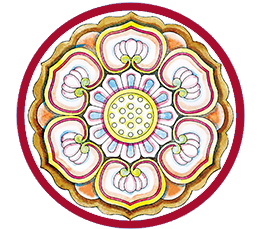Buddhism Q&A (5)
By Householder Fo'en
Q18 : Whether male or female, one can choose to learn the Dharma with or without taking monastic vows?
A: Yes. Buddhism's male monastics are called bhikkus, and female monastics are called bhikkunis. Male and female lay followers are called upasaka and upasika respectively. Together they are known as the four groups of disciples.
Q19 : Where did Shakyamuni Buddha travel and teach during his lifetime?
A: Mainly in central India. The places the Buddha resided for most of his lifetime were Rajgir and Sravasti, in the states of Magadha and Kosala respectively. Outside Rajgir was a bamboo forest, donated to the Buddha and his disciples by King Bimbisara. It was later known as Bamboo Grove Monastery. In Sravasti, Prince Jeta of Kosala and a rich merchant, Sudatta, together gave the Buddha a garden, subsequently named Jeta Grove Monastery. Gijjhakuta Hill (Vulture Peak), south of Rajgir, was another place where the Buddha gave many discourses. Shakyamuni Buddha taught the Dharma teaching for 49 years, until he passed into nirvana at the age of 80.
Q20 : What is "nirvana"?
A: Nirvana is a state that is very hard to describe with words. It carries the meanings of extinction, cessation, non-birth, inaction, peace and joy, liberation and death. It also connotes elimination of the karma of birth and death, transcendence of the rebirth cycle, perfection of wisdom and virtue, and achievement of an eternal, quiescent, steady and joyous state of liberation. Such a state can "only be known by sacred beings." It cannot be measured with concepts such as "present," "absent," "coming" and "going." It is an unfathomable state of liberation.
To describe it thus with words is already very inaccurate. The state of liberation is an actual experience obtained through spiritual practice in accordance with the Dharma. It cannot be deduced by the logic of worldly thinking.
Characteristics
- Recitation of Amitabha’s name, relying on his Fundamental Vow (the 18th)
- Rebirth of ordinary beings in the Pure Land’s Realm of Rewards
- Rebirth assured in the present lifetime
- Non-retrogression achieved in this lifetime

The 18th Vow of Amitabha Buddha
If, when I achieve Buddhahood, sentient beings of the ten directions who sincerely and joyfully entrust themselves to me, wish to be reborn in my land and recite my name, even ten times, should fail to be born there, may I not attain perfect enlightenment. Excepted are those who commit the five gravest transgressions or slander the correct Dharma.
Guiding Principles
Faith in, and acceptance of, Amitabha’s deliverance
Single-minded recitation of Amitabha’s name
Aspiration to rebirth in Amitabha’s Pure Land
Comprehensive deliverance of all sentient beings
